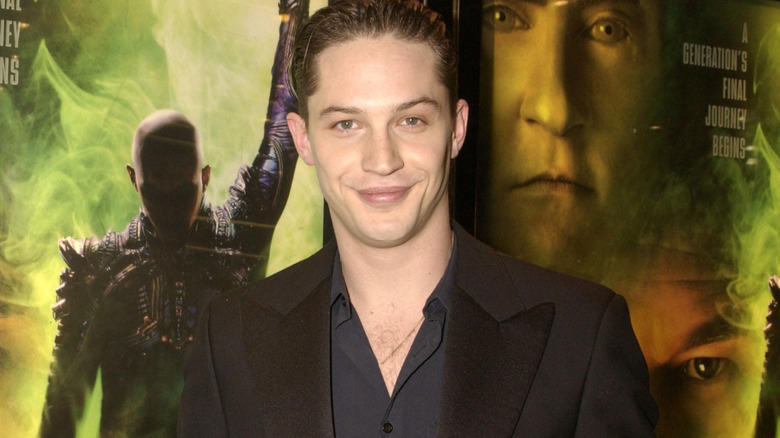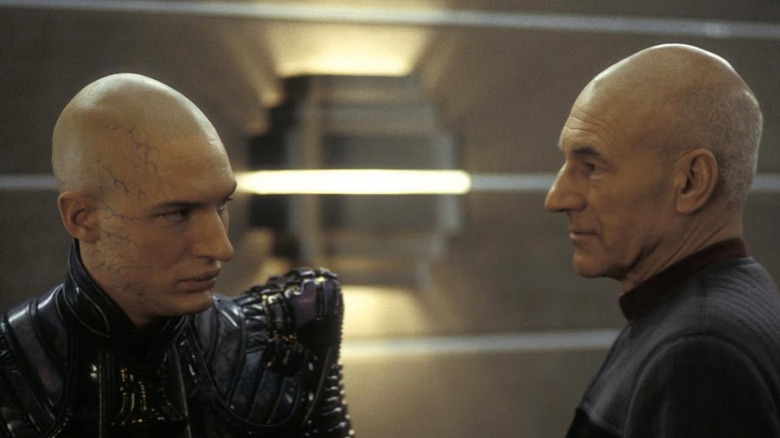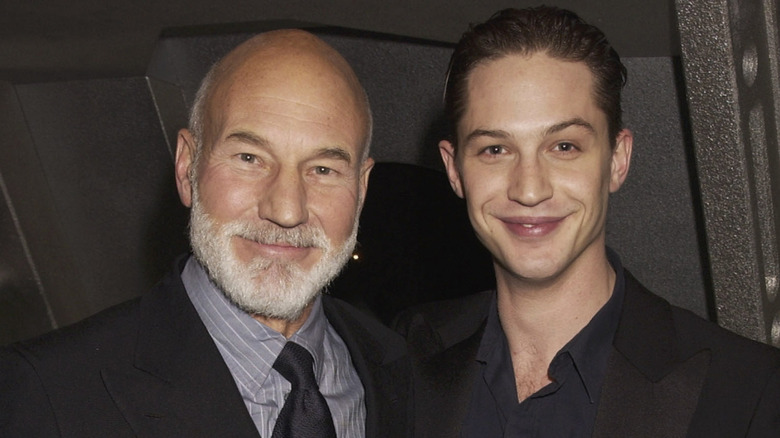The Star Trek Character Tom Hardy Played Before His Rise To Fame
Tom Hardy has accomplished quite a lot in a professional career that hasn't even yet hit the 30-year mark. He's become a celebrated stage and screen actor, is involved in a lot of philanthropic work, and is even a solid rapper who kept the hobby a secret by swapping up his humble Tom Hardy identity for that of the punchier Frankie Pulitzer. As far as screen credits, Hardy racked up minor characters of increasing visibility in film and on television before his breakthrough roles in "Warrior," "Inception," and "The Dark Knight Rises." What many people forget is that those pre-breakthrough roles included a particularly notorious installment of the "Star Trek" film franchise.
Given that "Star Trek: Nemesis" performed so poorly that it not only ended the "Next Generation" era of the franchise (until "Picard" revived it), but "Star Trek" films altogether for seven years, Hardy's appearance in that movie didn't add much ignition to his rocket towards mainstream fame. Obviously Hardy's career would be just fine, as would the "Star Trek" franchise — eventually — but it still marked an embarrassing footnote for the paths of both.
Tom Hardy's character is a young clone of Picard
When ranking the "Star Trek" movies worst to best, "Nemesis" comes at or near the bottom of almost every list. Among the many issues is the fact that its director, Stuart Baird, was unfamiliar with both "The Next Generation" and the franchise in general. As such, he sidelined most of the crew, making the movie almost entirely about Captain Picard (Patrick Stewart) with the notable exception of Data's (Brent Spiner) grandiose self-sacrifice to save the day at the end.
So what was "Nemesis" about, then? Well, that's where Tom Hardy comes in. He plays the movie's main villain, Shinzon — a character who gets more depth and screen time than anyone else in the story other than Picard. Shinzon is the rebel leader of the Remans, a forgotten caste of Romulans who have led a takeover of Romulus, and he's looking to get the Federation on his side. Not only do Picard and his crew discover that Shinzon's plans in regards to the Federation are not what they seem, but an even bigger twist is soon revealed: Shinzon, as it turns out, is actually a clone of Picard.
Given that Hardy had make-up and prosthetics to make him look like a younger Picard, that didn't do any favors to whatever increased visibility the role might have brought him. All anyone saw was a young Patrick Stewart. But the movie flopping and being almost universally maligned pretty much sealed that deal anyway, even if Hardy could have looked more like himself in the role of Shinzon.
Patrick Stewart thought Hardy would never work again after Nemesis
It wasn't only the critics and audiences watching "Star Trek: Nemesis" that didn't enjoy themselves. In the "Next Generation" cast's own opinion, it was a troubled production overseen by the wrong director, with the actors all too aware that they weren't ending their "Star Trek" careers on a high note. It also seemed like even franchise newcomer Tom Hardy didn't want to go out of his way to have a good time on the set.
Patrick Stewart avoided Hardy on the set of "Nemesis," but it was actually Hardy who first established that distance between the two actors. In Stewart's 2023 memoir, "Making It So," he claimed that Hardy didn't engage with any of his co-stars between takes, or behave socially after a day of shooting. Nor would he spend a single second longer hanging around the set than was required of him. So Stewart decided to just let the young actor have his process, and didn't push Hardy to be social or interact with him when the cameras weren't rolling. However, Stewart did predict that Hardy's career wasn't going to go well if that was going to be how he conducted himself on sets and with his co-stars. Stewart admitted to confiding to Jonathan Frakes and Brent Spiner that they'd probably never see or hear about this Tom Hardy fellow ever again.
Of course, by the time Stewart released that memoir, he had long since realized just how far off that prediction was. And in typically sweet and humble Patrick Stewart fashion, he wrote how happy he was to have been wrong about his assumptions for the future of Hardy's acting career. As for Hardy, he would mention in several later interviews that he felt a lot of nerves, a lot of pressure, and was in way over his head on the set of "Nemesis," which would help to explain why he acted the way he did.


